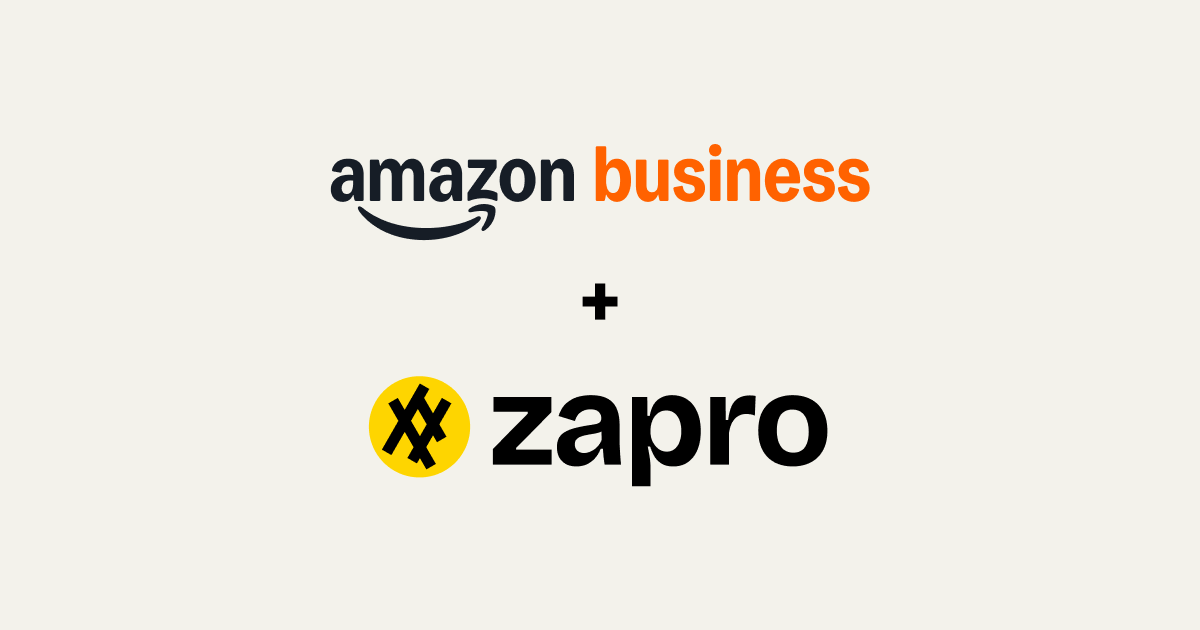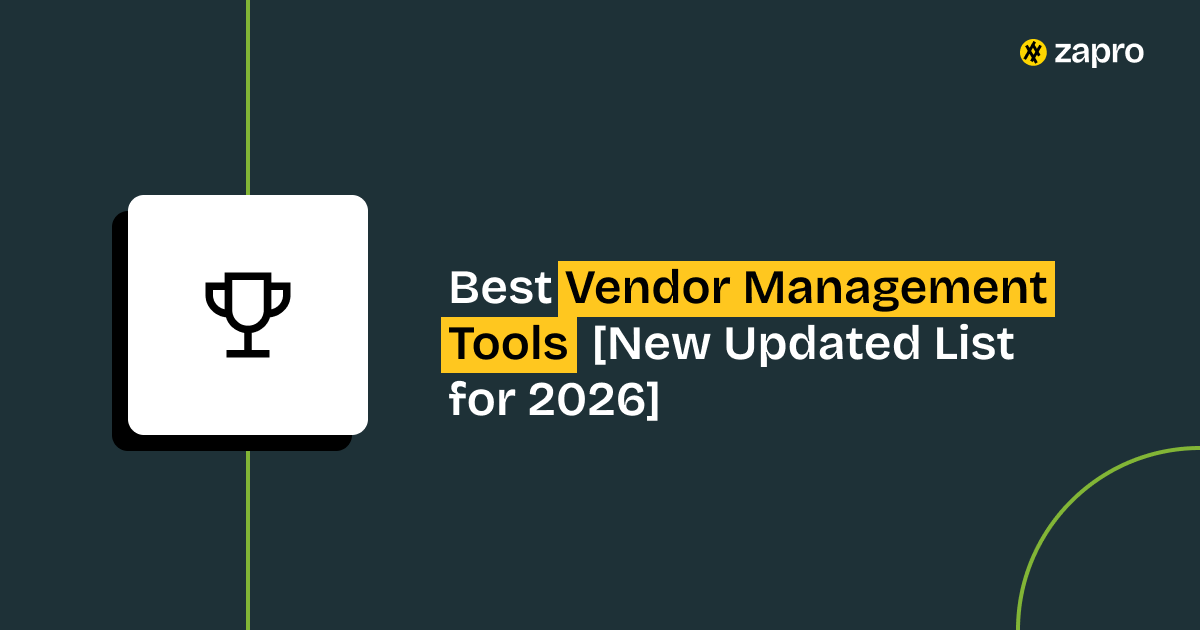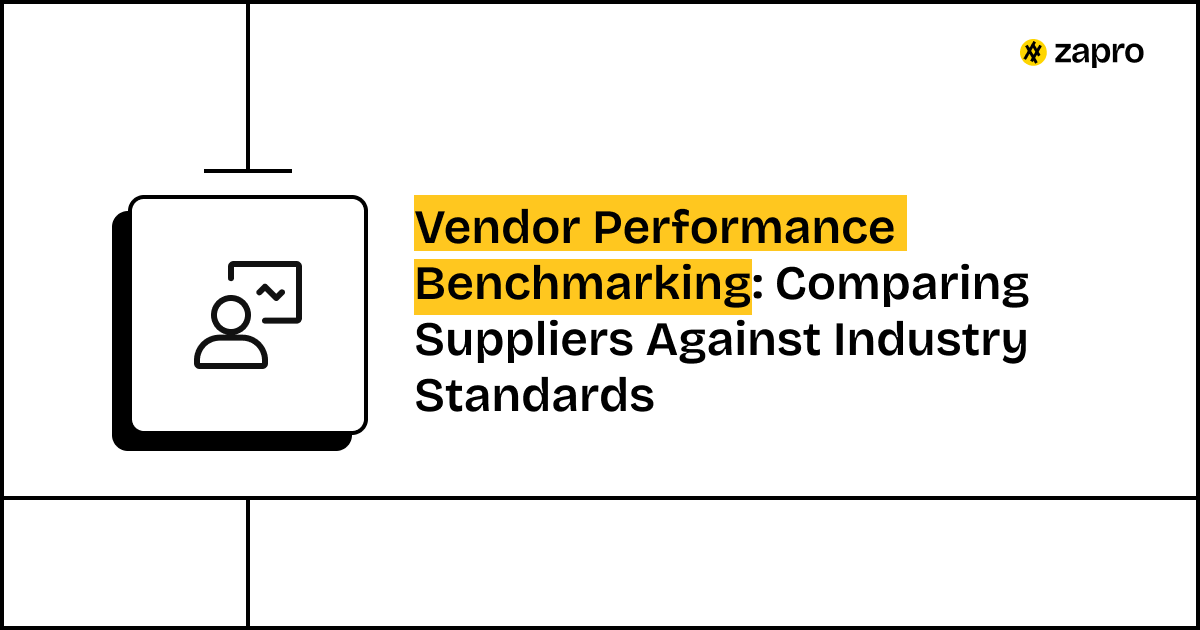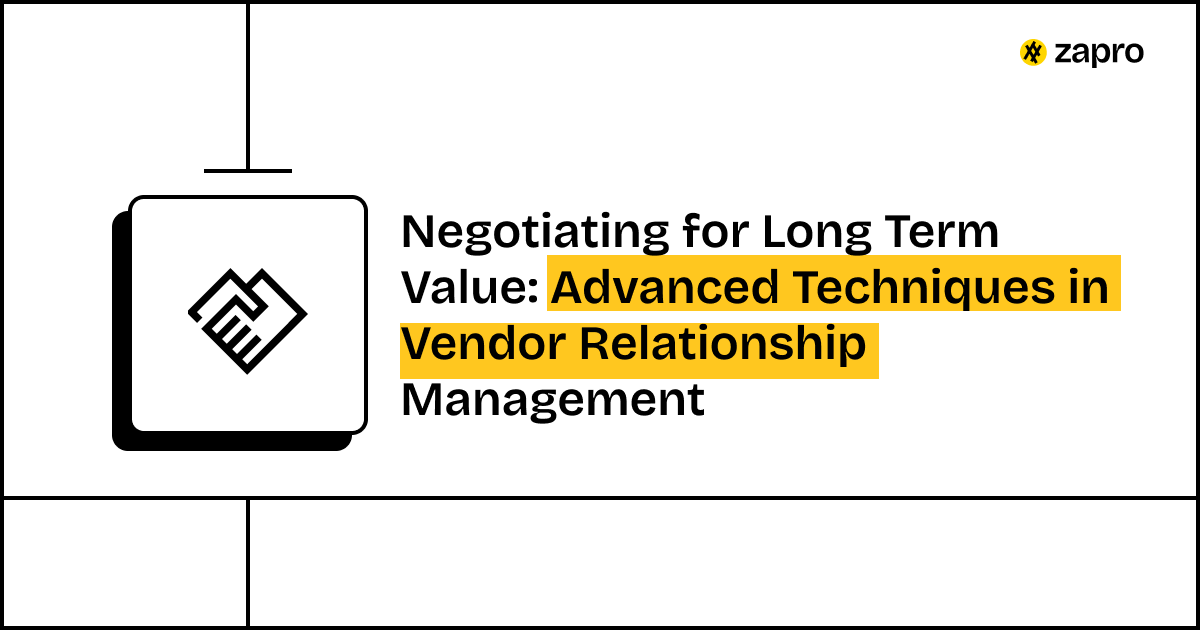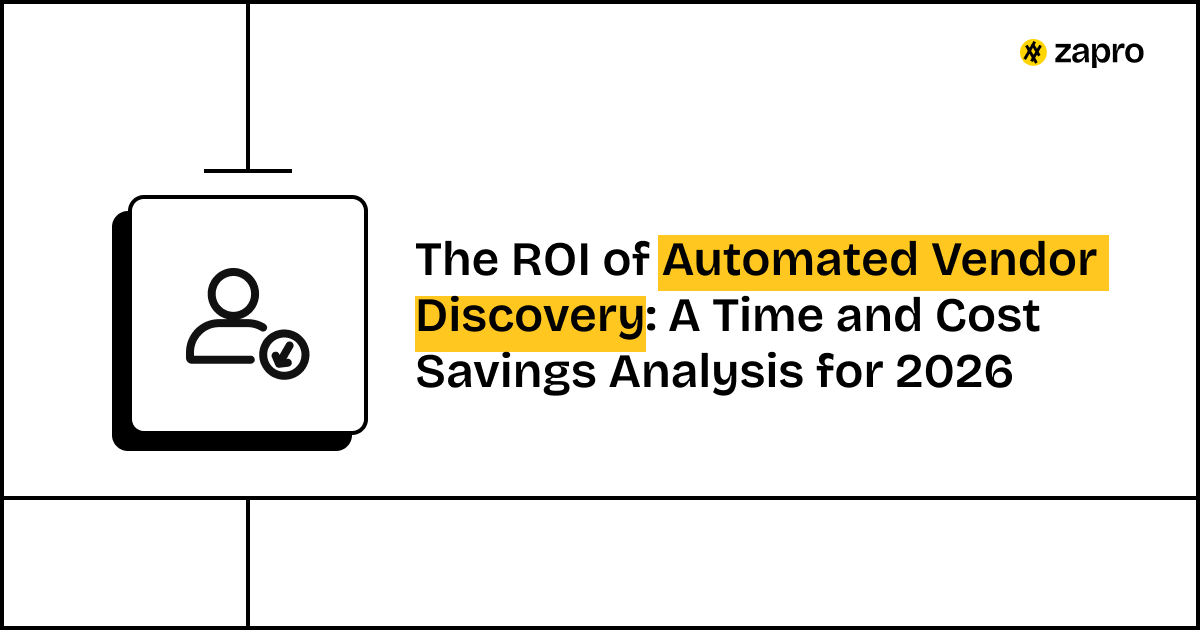Vendor relationship management tools are centralized platforms that help businesses manage multiple suppliers across different locations by consolidating vendor data, contracts, compliance requirements, and performance metrics in one system. These tools replace spreadsheets and email threads with automated workflows for vendor onboarding, contract management, performance tracking, risk assessment, and communication management. Leading VRM solutions like Zapro, SAP Ariba, Coupa and Oracle Supplier Management enable procurement teams to strengthen supplier relationships, ensure compliance, and make data-driven sourcing decisions through real-time analytics and collaboration features.
What is vendor management tools?
Vendor management tools are software platforms that help businesses organize and manage all their supplier relationships in one place. They make it easier to onboard new vendors, track performance, handle contracts, and monitor risks, without juggling endless spreadsheets or emails.
In simple terms, these tools give procurement teams a clear view of who their suppliers are, how they’re performing, and whether they meet compliance standards.
Example:
For instance, a retail brand might use a vendor management tool like Zapro to onboard new suppliers, keep tabs on delivery timelines, and get alerts when a contract is about to expire, all from one easy-to-use dashboard.
Top vendor management software solutions in 2025
The market right now is overflowing with tools that claim they will help you manage vendors better. But here is the thing… not all of them actually live up to that promise. Some are great for big companies, some are better for small teams, and a few just end up being more work than help.
So to make life a bit easier, we pulled together a list of some of the top vendor management software options for 2025.
1. Zapro
Zapro is pretty new compared to the big names, but it has already made a lot of noise. It is an AI-powered vendor management platform that tries to cover the whole lifecycle: onboarding, approvals, performance, risk, all of it. What people seem to like is that you do not need a whole IT team just to run it. The no-code setup and simple dashboards make it much easier than juggling spreadsheets or chasing emails.
Key features of Zapro:
- Automated vendor onboarding and approvals (so yeah, you no longer are chasing signatures)
- Dashboards and scorecards that can give you a full 360 degree view of your performance
- Real-time risk monitoring with alerts when something feels off
- One place to store all contracts and vendor info
Pros: Quick setup, predictive insights, custom workflows without coding.
Cons: We’re still building out integrations, and yes we ain’t as battle-tested with big global clients yet.
Best for: Zapro is pretty great for Smaller and mid-sized procurement teams that want automation but cannot afford heavy IT.
Improve your supplier relationship in just a click!

2. SAP Ariba
SAP Ariba has been around for ages. If you are in a big enterprise and already use SAP, chances are you have at least heard of it. It is not the simplest system, but it is known for being reliable at scale. You get everything from supplier onboarding to risk checks, and it is tightly connected to SAP ERP.
Key things here:
- Full supplier lifecycle coverage (onboarding, qualification, segmentation)
- Strong ERP integration
- Supplier portals for easier collaboration
- Risk and compliance controls that match global standards
Pros: Rock solid platform, massive supplier network, and is trusted by very big global enterprises.
Cons: Coupa can actually take some time to roll out, and it often feels like overkill for smaller businesses.
Best for: it is very good Multinationals that need scale and strict compliance.
3. Coupa
Coupa is more about spend management, but Vendor relationship management tools is part of it. It is cloud-based and very user-friendly. Many teams like the fact that it gives them not just vendor oversight but also insights into where money is going and how to cut costs.
Highlights:
- Supplier portal with updated profiles and e-invoicing
- Workflows for approvals and contract management
- Reporting and analytics that actually make sense
- Community-based insights (they call it “community intelligence”)
Pros: Clean design, very strong analytics, scales well.
Cons: Pricing is premium, and some features are locked behind add-ons.
Best for: Larger teams that want to focus on spend optimization.
4. Gatekeeper
Gatekeeper leans more toward contracts and risk, but it handles vendors too. It is often chosen by companies that want a strong contract repository plus compliance checks. The interface is nice, but if you want to use all its advanced features, you might need a power user in the team.
What it comes with:
- A big central contract repository
- Custom onboarding forms and due diligence
- Kanban-style workflow engine for approvals
- Market IQ for third-party risk data
Pros: Very flexible, great risk analytics, easy to navigate.
Cons: Needs some training for advanced stuff.
Best for: Teams that want contracts and vendors tied closely together.
5. Kissflow
Kissflow is more of a workflow automation tool than a traditional VMS. That said, it is good if you want something low-code that your team can shape around how you already work. You can drag and drop workflows, integrate with your ERP, and tweak things as you grow.
Kissflow features worth noting:
- Workflow builder (visual, drag and drop style)
- ERP and procurement integration
- Dashboards with live vendor metrics
- Low-code interface
Pros: It is very flexible, far simpler to adapt, is nice for mid-sized teams.
Cons: But not ideal and good for very large enterprises with strict rules.
Best for: Mid-market organizations looking for something customizable but not too heavy.
Learn more about Tropic Alternative.
6. Precoro
Precoro is aimed at SMBs that want something simple. But see, it is not trying to compete with say products like SAP or Coupa; instead, it rather focuses on things like easy onboarding, decent spend visibility, and simple straightforward reporting. By the way, it also integrates with accounting software, which is a plus for smaller companies.
What you get with Precoro:
- Custom onboarding forms
- Spend and compliance reporting
- Supplier portal for catalogs and updates
- Integrations with apps like QuickBooks, Xero, NetSuite
Pros: It is affordable, easy to use, and very good reporting.
Cons: But unfortunately very limited depth in compliance/risk features.
Best for: Some of the small to medium-sized businesses.
7. Workday VNDLY
This one is very specific. Workday VNDLY is all about managing contingent workers, project contractors, and statement-of-work agreements. If your business relies heavily on external labor, this tool makes sense.
Features:
- Contingent workforce management
- Project (SOW) tracking with compliance
- Global invoicing and rate card management
- Vendor portal
Pros: Excellent for workforce management, strong compliance.
Cons: Really shines only if you are already using Workday.
Best for: Companies with heavy reliance on contractors.
8. Jaggaer
Jaggaer is a heavy hitter when it comes to vendor management. It covers source-to-pay and has a strong vendor management side too. It is analytics-heavy, compliance-focused, and definitely built for big players.
But, the downside though? Complexity.
What you get:
- Supplier qualification and segmentation
- Risk dashboards
- Automated onboarding and workflows
- Collaboration tools for big, distributed, global teams
Pros: It has a deep analytics built-in, strong compliance, and a good global reach.
Cons: Yes, obviously it is complex and takes some time to learn, premium cost.
Best for: Enterprises with complex procurement.
9. GEP SMART
GEP SMART brings vendor management as part of its full suite. You get everything in one place: contracts, risk, analytics, onboarding. It is highly scalable, but again, it can feel a bit complex for smaller teams.
Key features:
- Supplier lifecycle coverage end-to-end
- Predictive analytics for risk and performance
- Contract management
- ERP integrations
Pros: Strong in analytics and scalability.
Cons: Can feel heavy during implementation.
Best for: Large enterprises that want everything unified.
10. Oracle Procurement Cloud
Oracle’s offering is aimed at enterprises already in the Oracle ecosystem. It automates onboarding, compliance, and vendor tracking, but the catch is: it works best if you are fully on Oracle already.
What it includes:
- Automated onboarding with policy enforcement
- Contract and compliance tracking
- Performance dashboards and analytics
- ERP/finance integration
Pros: Seamless with Oracle, very strong automation.
Cons: Less flexible if you use non-Oracle systems.
Best for: Enterprises that are already committed to Oracle.

77% of companies said they are investing in deeper and more collaborative supplier relationships to improve resilience and agility.
– Gartner
Summary of all the 10 vendor management software solutions
| Solution | Key Features | Pros | Cons | Best-fit Use Case |
| Zapro | AI onboarding, risk, scorecards, dashboards | Fast, predictive, flexible | Newer, fewer integrations | Agile, automated vendor ops |
| SAP Ariba | Lifecycle, risk, ERP, self-service portal | Global, compliant, mature | Complex, lengthy onboarding | Multinational, compliance focus |
| Coupa | Portal, analytics, automation, benchmarking | User-friendly, scalable | Premium pricing, add-ons | Spend optimization, supplier excellence |
| Gatekeeper | Workflow, risk, contract, portal, Market IQ | Flexible, risk analytics | Needs skilled users | Growing teams, contract/risk visibility |
| Kissflow | Low-code, workflow, dashboard, integration | Adaptable, simple | Not for large/regulatory firms | Mid-size, evolving automation |
| Precoro | Onboarding, reporting, portal, integrations | Easy, strong onboarding | Less risk/compliance depth | SMB compliance, transparency |
| Workday VNDLY | Contingent/SOW mgmt, compliance, spend | Workforce/project focus | Best for Workday users | Extended workforce procurement |
| Jaggaer | Qualification, risk, onboarding, collaboration | Deep analytics, global | Complex, costly | Global, risk-heavy supplier mgmt |
| GEP SMART | Analytics, contracts, supplier scoring | Analytics, scalable | Complex for new users | Unified procurement, supplier mgmt |
| Oracle Procurement | Onboarding, compliance, contract, dashboards | Oracle synergy, robust | Ecosystem lock-in | Oracle-based, complex procurement |
What a vendor relationship management tools can do for your business
A vendor management tool from a leading-tier company does much more than just keep the supplier data—it essentially changes the way your company interacts with vendors on a daily basis. You have an option to automate onboarding, evaluate through scorecards, and even take care of compliance as you get all the alerts in real time when you are missing documents or when the expiry date of certifications is approaching. Since everything is stored in one single platform, teams have no problems with dispersed emails, files that have gone missing, and the lack of communication between departments.
Besides organization and compliance, these instruments enhance your supplier relationships by making collaboration more accessible and shortening the response times. Procurement teams become more knowledgeable about risk, spend, and performance trends, and suppliers are provided with a well-structured, transparent method of communication with your business. Whether it is to reduce manual work, have better control over the budget, or simply work smarter with your suppliers, a modern vendor management tool is the way to make your procurement function more resilient, efficient, and scalable.
Why Vendor Management Software Is a Game-Changer for Modern Businesse
So, vendor management software is not just a fancy database to dump supplier info in. It actually affects how well a business keeps costs in check, how much risk it avoids, and honestly, how strong the relationships with suppliers turn out to be.
1. Making vendor onboarding less painful
Onboarding vendors by email is a nightmare. You know the drill; forms get lost, approvals take forever, someone forgets to attach a document. With software, vendors just upload everything in one place, and things move much faster. It is cleaner, more consistent, and yeah, way less stressful.
2. Better communication and collaboration
Ever been stuck in a 20-email thread just to confirm one small update? Happens all the time. With a shared system, you do not need that. All the files, all the notes, all the requests, they live in one spot. No more scrolling through inboxes wondering who dropped the ball.
3. Visibility and accuracy that actually makes sense
This one is big. Dashboards give you live numbers, spend, risks, performance, so you can actually trust the data. No more digging through random spreadsheets from five different teams. Leaders can finally make decisions without second-guessing if the data is even right.
4. Risk and compliance without the panic
Everyone hates compliance until it goes wrong. A system gives you alerts: like hey, that certificate is about to expire, or this contract needs renewing. It is basically like a safety net that keeps you from missing stuff that could otherwise blow up later.
5. Saving money and cutting down busywork
And yeah, let’s be realistic, it saves a lot of cash too. Duplicate invoices get caught, manual work goes way down, and you even see where to negotiate better deals. Less wasted money, less wasted time, and fewer headaches for everyone.
Key benefits of vendor management software
Alright, so here is the thing. Vendor management software is not some magic wand, but it does take away a lot of the boring pain nobody wants to deal with.
The “benefits” sound fancy in slides, but in reality, they are just the everyday fixes that make your life easier. Let’s walk through them one by one.
1. Cost control and budgets not going crazy
If you are using spreadsheets, good luck knowing where your money really went. Seriously, half the time you only find problems when it is too late. A VMS just throws everything on one screen; so you see “oh wait, we paid Vendor A twice” or “huh, Vendor B keeps charging more than agreed.” It gives you the chance to stop the bleeding, renegotiate, and not get blindsided by budgets blowing up.
2. Tracking vendor performance (without guessing)
Vendors are like students, some ace it, some scrape by, and some just keep missing homework. A decent system gives you scorecards, KPIs, and all that, so you are not relying on gut feel. You can actually see who is late, who delivers what they promised, and who needs a nudge. Better to catch it early than after your customer starts yelling.
3. All the data in one place
Ever had to find a contract and someone goes “oh maybe check Raj’s folder” or “I think finance has it”?
Yeah, nightmare. With a VMS, everything, from contracts, certifications, vendor contacts, to emails, just lives in one spot. No more treasure hunts.
4. Automation (aka less grunt work)
See you have to think about how much time is wasted chasing approvals, or maybe checking if a certificate is expired, or even sending reminders that nobody reads.
Now, you imagine the system can just do that for you. That is what automation is.
Less boring admin, more time for actual work.
5. Keeping things secure
Money is involved, so fraud will always be a risk. At least with access controls and audit trails, you know exactly who did what. If something looks shady, you can trace it back. Also, your sensitive vendor data is not lying around in random emails anymore.
6. Compliance without heart attacks
Deadlines for certifications or licenses sneak up on people. Miss one and suddenly you are paying fines. A VMS nags you before it expires, keeps the docs handy, and makes audits way less scary. Honestly, it saves your skin.
7. Building better supplier vibes
Suppliers hate being in the dark as much as you do. When they can log in, see updates, get feedback, and track stuff without calling you five times, they are happier. And happy suppliers usually deliver better and are more flexible when things go wrong.
Essential features to look for in a vendor management software
Let me tell you straight, not every vendor management system out there is worth the trouble. Some of them look nice on a demo but the second you start actually using them, you realize half the stuff does not work the way you expected. The real trick here is to ignore the flashy extras and focus on the parts that actually make your life easier day to day.
1. Vendor onboarding tools
Getting new vendors onboard should not feel like a never-ending email chase. A proper system gives you digital forms, upload spots for all their docs, and simple approval steps.
Instead of weeks of back-and-forth, you get them set up in a few days. That alone saves headaches.
2. Performance scorecards & KPIs
You cannot fix or improve something unless you are measuring it. Scorecards that track things like how fast deliveries are, the quality of what you get, or even how responsive the vendor is when problems come up; that is the stuff that shows you who is solid and who is dragging their feet. And bonus, you get actual numbers to back up those conversations.
3. Risk & compliance management
This one is a lifesaver. A decent VMS should be flagged when insurance expires, or when a certification goes missing, or if some policy is not being followed. Basically it should warn you before a small issue snowballs into an audit mess. Think of it as having a built-in watchdog so you do not have to hover over every single vendor.
4. Contract management & renewal alerts
Be honest; how many times have companies let contracts roll over just because no one noticed the date? Happens a lot more than anyone admits. A good VMS stores all those contracts in one place and pings you before renewals sneak up. That way you actually get the chance to renegotiate instead of being stuck with whatever terms are already there.
5. Integration with ERP, finance, and procurement tools
If your shiny new system does not talk to the tools you already use, it is just another silo. That is pointless. You want it to connect smoothly with ERP, finance, procurement, whatever you are running, so the data flows properly and you are not bouncing between ten screens.
6. AI-powered insights & automation
This is where the newer systems actually get interesting. Some can flag risks before they turn into problems, or even show you areas where you could be saving money. On top of that, they handle the boring admin work like reminders or approvals. It is not magic, but it saves your team from burning hours on stuff no one enjoys doing.
7. Security and access control
You do not want vendor data or payment info in the wrong hands. Period. A decent VMS will have role-based access, proper audit trails, and encryption baked in. It is not glamorous, but you will thank yourself when auditors come calling.
How to choose the right vendor management software?
Alright. So once you exactly know the features you want, how do you actually pick a system? Especially, with the sheer number of options out there, it is really easy to get lost in the noise. But, here is one simple way to cut through it.
1. Assess business needs
Do not start by shopping. Start by figuring out your problems. Is compliance a mess? Are you stuck chasing onboarding paperwork? Or maybe you just cannot see clearly where the money is going. Whatever keeps you up at night — that should set your direction.
2. Prioritize key features
Every tool will claim it can do everything. That is marketing. What you need to figure out is which feature matters most for your situation. If compliance is killing you, that is priority one. If vendor performance is the problem, then focus on scorecards.
3. Check integration capabilities
Standalone tools can actually make life worse if they do not connect. You need this thing to work with your ERP, finance, procurement, basically whatever stack you already rely on. Otherwise, you are practically creating new silos instead of solving the older ones.
4. Evaluate the ease of use and UI/UX
If the software feels clunky, no one will really want to use it. It is that plain and simple. Look for something your team can figure out without spending weeks in training. Clean, intuitive design means higher adoption.
5. Consider scalability and pricing
A small business has very different needs from a global enterprise. Do not get stuck with a system that you will outgrow in two years. And watch pricing closely — hidden costs are real, and they add up fast.
6. All in one vs the best-of breed
Some companies like the simplicity of one big suite that does everything. Others prefer smaller tools that do one thing really well. Neither option is wrong. It depends on how big and complex your setup already is.
Which is the right Vendor management tool for different business sizes?
Let’s be real here; because different businesses need different kinds of tools. What works for a small shop is going to feel like a toy for a big enterprise, and the giant platforms used by multinationals will just drown a small team in complexity. So, it really depends on your size, your budget, and honestly how messy your vendor stuff already is.
1. Small businesses
For smaller teams, the goal is not fancy features, it is survival. You just want something simple that keeps all your vendor details in one place.
Maybe it is contact info, contracts, invoices, whatever; you do not want to keep chasing them in emails or ten different spreadsheets. Even a light system that just automates basic things like approvals or reminders makes a huge difference. And the best part, it should not take six months to set up or cost a fortune.
2. Mid-size companies
Now, once the business grows, it gets messy very quickly. Suddenly you are juggling dozens or even hundreds of vendors.
Somebody asks you, “When does this contract expire?” and you are stuck scrolling through old files. This is the point where you need a tool that can handle more than the basics. Things like vendor scorecards, performance tracking, and proper contract management start to matter. Integration also becomes a must,you do not want to be typing data twice into both procurement and finance. That gets old fast.
3. Large enterprises & multinationals
If you are a global player, it is a whole different headache. Vendors across countries, multiple currencies, crazy compliance rules… you name it.
Lightweight tools will not work here. You need something that is enterprise-level, with compliance baked in, strong analytics, and the ability to plug directly into ERP and finance systems. Security is non-negotiable too; because with thousands of vendors and millions at stake, even one slip-up can be painful. Scalability matters as well, since your vendor list is not getting any smaller.
Key Takeaways
- The platform unifies all supplier management functions through a single platform which handles onboarding and performance tracking and contract management and risk assessment.
- The system uses automated workflows with no-code functionality to decrease manual work while accelerating approval processes.
- The system provides instant access to vendor performance data through dashboards and scorecards which offer complete visibility.
- The system provides real-time risk detection and compliance verification to stop unexpected events and safeguard your business operations.
- The system adapts to business growth while providing seamless connections to procurement systems and financial management and Enterprise Resource Planning (ERP) platforms.
- A unified solution provides superior efficiency and consistency and control compared to using separate tools for each function.
Why is Zapro the best vendor management software across business segments?
Here is the thing—the market is full of Vendor relationship management tools. Everywhere you look, someone is promising “the best solution.” But the real question is not which one looks the best on paper, it is which one actually fits your business right now, and will not collapse when you grow tomorrow. Some of the so-called big names have plenty of features, sure, but they also come with headaches: steep costs, endless setup time, or systems that feel like they are built for someone else’s problems, not yours.
That is kind of where Zapro stands out. It was not built as a “one size fits all” monster. It was actually built with real procurement teams, CFOs, and ops people in mind.
It actually does the basics right, something you cannot live without: like onboarding vendors, tracking their performance, managing contracts, and even keeping an eye on compliance. But then it layers in some very smart stuff like AI insights and automation, which actually helps you make super fast decisions instead of some platforms that merely dump data on you.
The best part? It is not a pain to use.
A lot of enterprise platforms make you feel like you need a PhD just to run a report. Zapro skips that nonsense. It is easy to roll out, simple enough for everyday users, but still powerful when you need to scale. You get dashboards, risk monitoring, ERP integrations, the whole deal, without the bloat and price tag that usually comes with it.
So, if you are at that stage where you are tired of just “managing” vendors and want a system that actually helps you save money, reduce risk, and build stronger relationships, Zapro is worth a serious look.
Think of it less as another tool and more like a smarter way to keep your vendor game tight.
Ready to take control of your vendor relationships?
Book a free demo with Zapro today and see how simple, powerful vendor management can be.

Streamline Your Vendor Management with Zapro
Set up in minutes, manage everything in one place.
Frequently asked questions
1. Is vendor management software suitable for small businesses?
Yes. Small businesses can use modern vendor management tools because they provide scalable solutions at affordable prices which help organizations centralize supplier data and enhance collaboration through contract management without requiring major IT expenses.
2. Who uses vendor management software?
The procurement team along with finance departments and operations managers implement procurement and vendor management tools to monitor supplier performance and manage costs and enhance supply chain communication.
3. What is the difference between vendor management software and procurement software?
The system for vendor management handles supplier relationship management and risk control and compliance monitoring, but procurement software handles the entire purchase cycle from requisition to payment. The combined system enables organizations to operate with maximum efficiency in procure-to-pay operations.
4. How does vendor management software handle security and compliance issues?
The leading vendor risk management solutions track supplier information and their certifications and regulatory compliance status through continuous real-time monitoring. The system protects data through audit trails and secure connection methods which also provide complete transparency.
5. Can I customize a vendor management software to fit my business needs?
Yes. The leading vendor management solutions provide adaptable modules and integration capabilities which enable users to match their business workflows and approval procedures and reporting needs. The software becomes more effective when users customize it to match their current operational methods.
6. What should I consider when choosing vendor management software?
Your selection should focus on systems that scale properly and integrate well and provide simple operation and robust risk management capabilities. A single platform that unites procurement and vendor management functions enables complete visibility and enhanced management capabilities.
Don’t miss our weekly updates
We’ll email you 1-3 times per week—and never share your information.
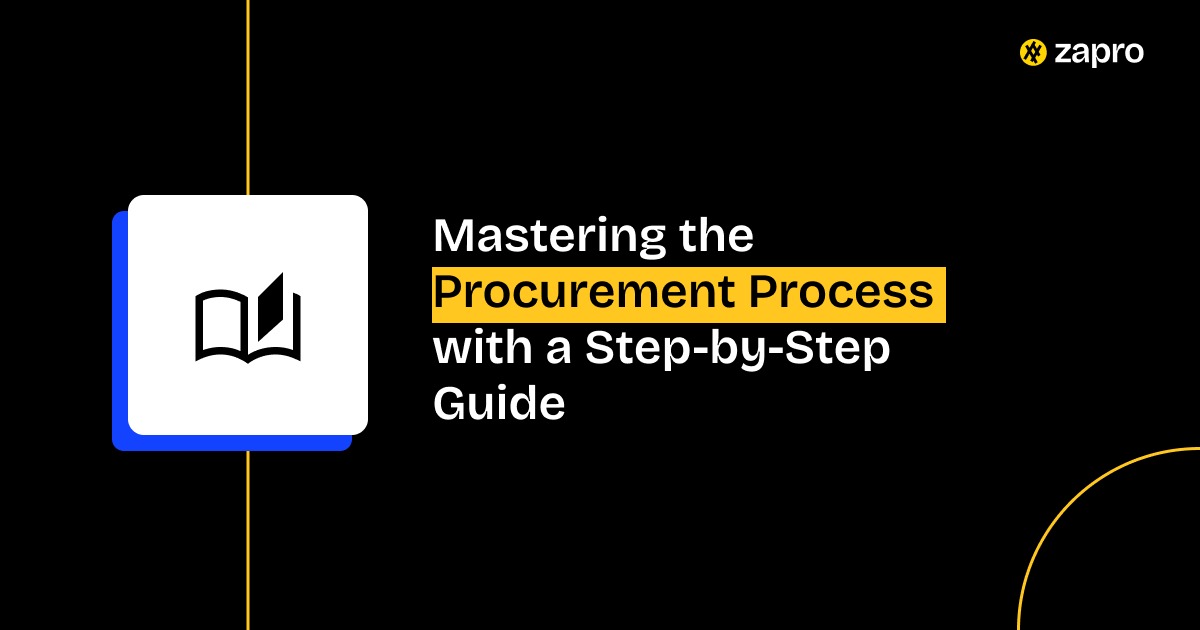
 Healthcare
Healthcare Financial Services
Financial Services Technology
Technology Venture Capitalist
Venture Capitalist Chief Procurement Officer
Chief Procurement Officer Chief Financial Officer
Chief Financial Officer